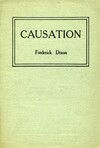

Are you sure?
This bookmark will be removed from all folders and any saved notes will be permanently removed.
Causation
Originally published in the 1911 Pamphlet titled “Causation”
Spiritual causation is the one question to be considered, for more than all others spiritual causation relates to human progress. —Science and Health, by Mrs. Eddy, p. 170.
The question of causation has been, for centuries, the riddle of the universe. The human mind has traveled, like Oedipus, over the sands of time, demanding with insistence, "What is life?" The globe, said an ancient people, rested on the howdah of an elephant, the elephant stood upon a tortoise—and then? With greater definiteness Mrs. Shelley explained how man was made in Frankenstein. The one solution is about as valuable as the other. Yet the explanation has existed all the time, for those with eyes to see, in the pages of the Bible. Even now that it has been given to it, the world claps its telescope to its blind eye, with the determination of Nelson, and declares, with all his vehemence, that it is unable to see the signal.
It has been said that every man, whether he knows it or not, is either a materialist or an idealist. Certainly human thought, in one channel or the other, has rolled down the hill of speculation into the ocean of doubt, throughout all the ages. The materialist, roughly speaking, insists that nothing exists but matter and the forces inherent in it. He accounts for its indestructibility by means of some one of his atomic theories, the proof of which he recognizes in the balanced action of chemical activity or the conservation of energy, and practically sums up life in the famous couplet of the Persian poet:
Enjoy 1 free Sentinel article or audio program each month, including content from 1898 to today.
JSH Collections
This article is included in:
1911 - PAMPHLET
Causation
JSH-Online has hundreds of pamphlets, anthologies, and special editions for you to discover.


